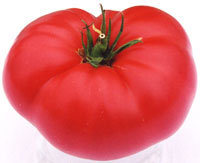
Benefits of Lycopene
Red tomatoes contain lycopene, an antioxidant that has been much in the news. There are in fact over 450 scientific articles linking lycopene to the prevention of cancer. Perhaps the most exciting of these was a randomized trial at Wayne State, Detroit, that tested the effect of adding lycopene to the diets of men undergoing conventional treatment for prostate cancer. Twenty-six men who had been newly diagnosed with prostate cancer were randomly assigned to receive a tomato extract containing 30 mg of lycopene or no supplementation for three weeks before the complete removal of their prostates (radical prostatectomy).
Nearly twice as many men who took lycopene had small tumors compared to those who didn't get the tomato extract (80 vs. 45 percent). Men who took lycopene were also nearly four times more likely to have the disease confined to the prostate than those who didn't take it (i.e., 73 vs. 18 percent had organ-confined disease). When it came to the widespread involvement of the prostate in cancer-like changes, 33 percent of the controls had this vs. zero percent of the lycopene group! And the average prostate-specific antigen (PSA) levels were also lower in the lycopene group compared with the controls. (Kucuk 2002) Those are impressive numbers that should be tested in larger, more rigorous studies.
You can of course buy lycopene supplements, and you might need to in order to get huge therapeutic doses. But for most purposes dietary sources of lycopene are readily available: tomato, tomato products and some other fruits and vegetables, such as watermelon. But make sure to drizzle your tomatoes with olive oil, the way the Italians generally do, since lycopene needs some oil to be properly digested and absorbed. Although I generally favor raw vegetables, scientists tell us that processed tomato products are rich in lycopenes. This includes tomato paste, tomato sauce and, of course, ketchup, which beneficially contains some oil.
Benefits of Organic
Talking of ketchup, a United States Department of Agriculture (USDA) study from the end of 2004 showed that organic ketchup has three times as much lycopene as some commercial brands. It also contains organic cane sugar as opposed to high-fructose corn syrup, which could be a boon to people with corn allergies. The USDA group tested 13 commercial ketchups – six popular national brands, three organic, two store brands and two from fast-food chains. They found that the organic brands were the most abundant in lycopene: one contained at much as 183 micrograms per gram of ketchup. By contrast, non-organic brands averaged 100 micrograms per gram. In fact, one fast-food brand contained a mere 60 micrograms per gram. Happily, Heinz is now marketing an organic ketchup in supermarkets. (Ishida 2004)
Choosing a tomato product for its lycopene content is relatively easy. First of all, read the label. Reject any product that uses artificial coloring, flavoring or preservatives. Then hold the bottle up to the light. Look for the darkest red color. Since lycopene is the natural red pigment in the tomato, the deeper the shade of red, the more of this phytonutrient you are likely to get.
A word of caution, though: one should use ketchup in moderation – even the organic brands are generally loaded with sugar. Despite what President Reagan thought, ketchup is not a vegetable, although I'm sure he would have taken comfort from this latest USDA finding.
 My StumbleUpon Page
My StumbleUpon Page






No comments:
Post a Comment